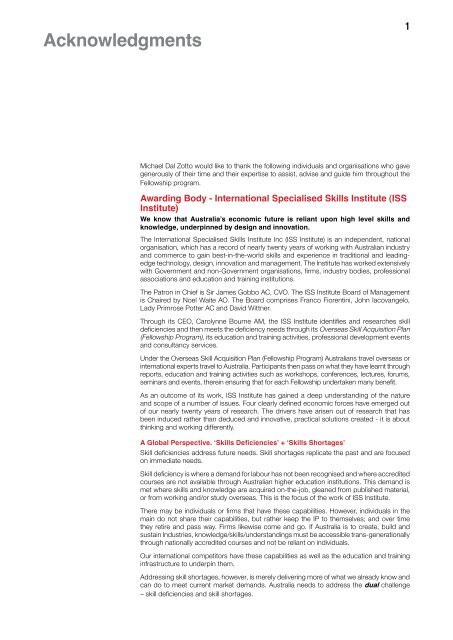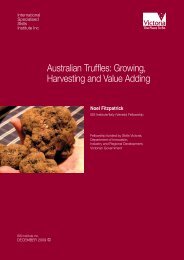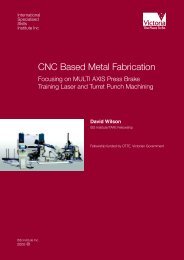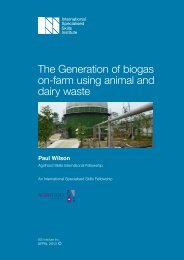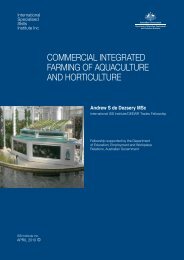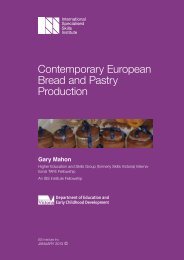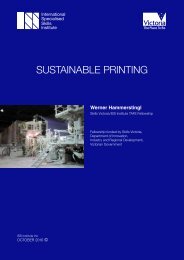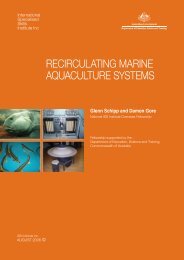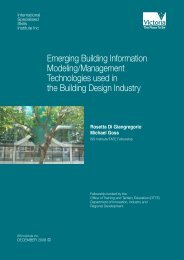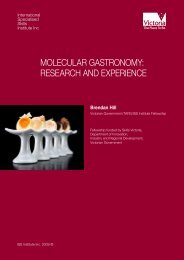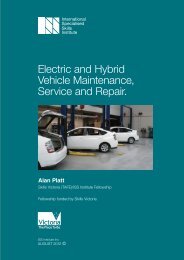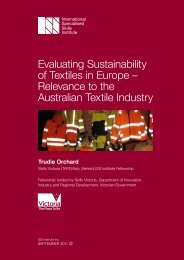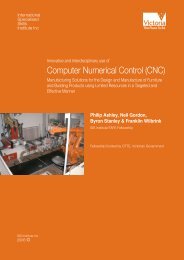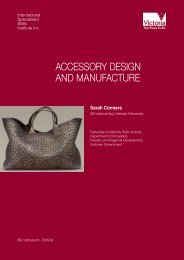Prosecco: a Grape Variety From the Veneto Region - International ...
Prosecco: a Grape Variety From the Veneto Region - International ...
Prosecco: a Grape Variety From the Veneto Region - International ...
You also want an ePaper? Increase the reach of your titles
YUMPU automatically turns print PDFs into web optimized ePapers that Google loves.
Acknowledgments<br />
Michael Dal Zotto would like to thank <strong>the</strong> following individuals and organisations who gave<br />
generously of <strong>the</strong>ir time and <strong>the</strong>ir expertise to assist, advise and guide him throughout <strong>the</strong><br />
Fellowship program.<br />
Awarding Body - <strong>International</strong> Specialised Skills Institute (ISS<br />
Institute)<br />
We know that Australia’s economic future is reliant upon high level skills and<br />
knowledge, underpinned by design and innovation.<br />
The <strong>International</strong> Specialised Skills Institute Inc (ISS Institute) is an independent, national<br />
organisation, which has a record of nearly twenty years of working with Australian industry<br />
and commerce to gain best-in-<strong>the</strong>-world skills and experience in traditional and leadingedge<br />
technology, design, innovation and management. The Institute has worked extensively<br />
with Government and non-Government organisations, firms, industry bodies, professional<br />
associations and education and training institutions.<br />
The Patron in Chief is Sir James Gobbo AC, CVO. The ISS Institute Board of Management<br />
is Chaired by Noel Waite AO. The Board comprises Franco Fiorentini, John Iacovangelo,<br />
Lady Primrose Potter AC and David Wittner.<br />
Through its CEO, Carolynne Bourne AM, <strong>the</strong> ISS Institute identifies and researches skill<br />
deficiencies and <strong>the</strong>n meets <strong>the</strong> deficiency needs through its Overseas Skill Acquisition Plan<br />
(Fellowship Program), its education and training activities, professional development events<br />
and consultancy services.<br />
Under <strong>the</strong> Overseas Skill Acquisition Plan (Fellowship Program) Australians travel overseas or<br />
international experts travel to Australia. Participants <strong>the</strong>n pass on what <strong>the</strong>y have learnt through<br />
reports, education and training activities such as workshops, conferences, lectures, forums,<br />
seminars and events, <strong>the</strong>rein ensuring that for each Fellowship undertaken many benefit.<br />
As an outcome of its work, ISS Institute has gained a deep understanding of <strong>the</strong> nature<br />
and scope of a number of issues. Four clearly defined economic forces have emerged out<br />
of our nearly twenty years of research. The drivers have arisen out of research that has<br />
been induced ra<strong>the</strong>r than deduced and innovative, practical solutions created - it is about<br />
thinking and working differently.<br />
A Global Perspective. ‘Skills Deficiencies’ + ‘Skills Shortages’<br />
Skill deficiencies address future needs. Skill shortages replicate <strong>the</strong> past and are focused<br />
on immediate needs.<br />
Skill deficiency is where a demand for labour has not been recognised and where accredited<br />
courses are not available through Australian higher education institutions. This demand is<br />
met where skills and knowledge are acquired on-<strong>the</strong>-job, gleaned from published material,<br />
or from working and/or study overseas. This is <strong>the</strong> focus of <strong>the</strong> work of ISS Institute.<br />
There may be individuals or firms that have <strong>the</strong>se capabilities. However, individuals in <strong>the</strong><br />
main do not share <strong>the</strong>ir capabilities, but ra<strong>the</strong>r keep <strong>the</strong> IP to <strong>the</strong>mselves; and over time<br />
<strong>the</strong>y retire and pass way. Firms likewise come and go. If Australia is to create, build and<br />
sustain Industries, knowledge/skills/understandings must be accessible trans-generationally<br />
through nationally accredited courses and not be reliant on individuals.<br />
Our international competitors have <strong>the</strong>se capabilities as well as <strong>the</strong> education and training<br />
infrastructure to underpin <strong>the</strong>m.<br />
Addressing skill shortages, however, is merely delivering more of what we already know and<br />
can do to meet current market demands. Australia needs to address <strong>the</strong> dual challenge<br />
– skill deficiencies and skill shortages.<br />
1


